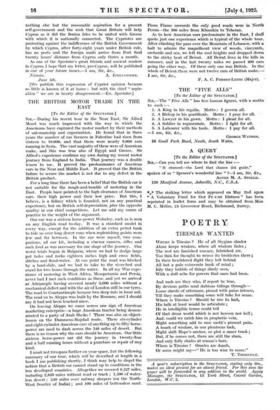THE BRITISH MOTOR TRADE IN THE EAST
[To the Editor of the SPECTATOR.]
Sia,—During his recent tour in the Near East, Sir Alfred Mond was much impressed with the way in which the Americans have captured the motor market by their methods of salesmanship and organization. He found that in three years the number of car licences in Palestine had risen from sixteen to 16,000, and that there were nearly 9,000 cars running in Syria. The vast majority of these were of American make, and this was true also of Egypt and Greece. Sir Alfred's experience confirms my own during my recent motor journey from England to India. That journey was a double lesson to me. It proved the predominance of American cars in the Near and Middle East. It proved that the British failure to secure the market is not due to any defect in the British product.
For a long time there has been a belief that the British car is not suitable for the rough-and-tumble of motoring in the East. People have pointed to the high clearance of American cars, their high power and their low price. But this, I believe, is a fallacy which is founded, not on any practical experience, but on British self-depreciation, plus the opposite quality in our chief competitors. Let me add my ounce of practice to the weight of the argument.
Our car was a sixteen horse-power Wolseley, such as is seen on any English road to-day. It was a standard model in every way, except for the addition of an extra petrol tank to tide us over long desert runs when replenishing points were few and far between. In the car were myself, two com- panions, all our kit, including a cinema camera, rifles and such food as was necessary for one stage of the journey. Our worst trials began in Bulgaria, where we had to dodge large pot holes and rocks eighteen inches high and cross fields, ditches and flood-water. At one point the road was blocked by a land-slide, and we had to take to the river-bed and crawl for two hours through the water. In all my War expe- rience of motoring in West Africa, Mesopotamia and Persia, never had I met such conditions as these, and yet we arrived at Adrianople having covered nearly 3,000 miles without a mechanical defect and with the air of London still in our tyres. The road to Constantinople became two deep ruts in loose soil. The road on to Aleppo was built by the Romans, and I should say it had not been touched since.
On leaving Aleppo we came across one sign of American marketing enterprise—a huge American tractor being demon- strated to a party of Arab Sheiks ! There was also an object-
lesson on the Damascus-Bagdad, route. There six-cylinder and eight-cylinder American cars of anything up to fifty horse- power are used to dash across the 548 miles of desert. But there is no reason why the cars should be American. Our little sixteen horse-power car did the journey in twenty-four and a half running hours without a puncture or repair of any kind.
I must not tresspass further on your space, but the following
summary of our tour, which will be described at length in a book I am publishing shortly, I think may help to dispel the notion that a British car cannot stand up to conditions in the less developed countries. Altogether we covered 8,527 miles, including 2,850 miles without road or track ; 1,500 of water- less desert ; 249 miles over railway sleepers (on the North- West imntier -of India) ; and 100 miles of bottomless sand.
From Fiume onwards the only good roads were in North Persia—the 500 miles from }Manikin to Teheran.
As to how American cars predominate in the East, I shall quote just one experience which is typical of the whole tour. After climbing the pass over the Mountain of Lebanon, with a• halt to admire the magnificent view of woods, vineyards, orchards and sea, we left the cool heights and dropped down to the sticky heat of Beirut. All Beirut lives in the hills in summer, and in the last twenty miles we passed 400 cars going the other way. Of these only one was British. In the whole of Beirut there were not twelve cars of British make.—i I am, Sir, &c.,
F. A. C. FonnEs-LErru (Major). '










































 Previous page
Previous page